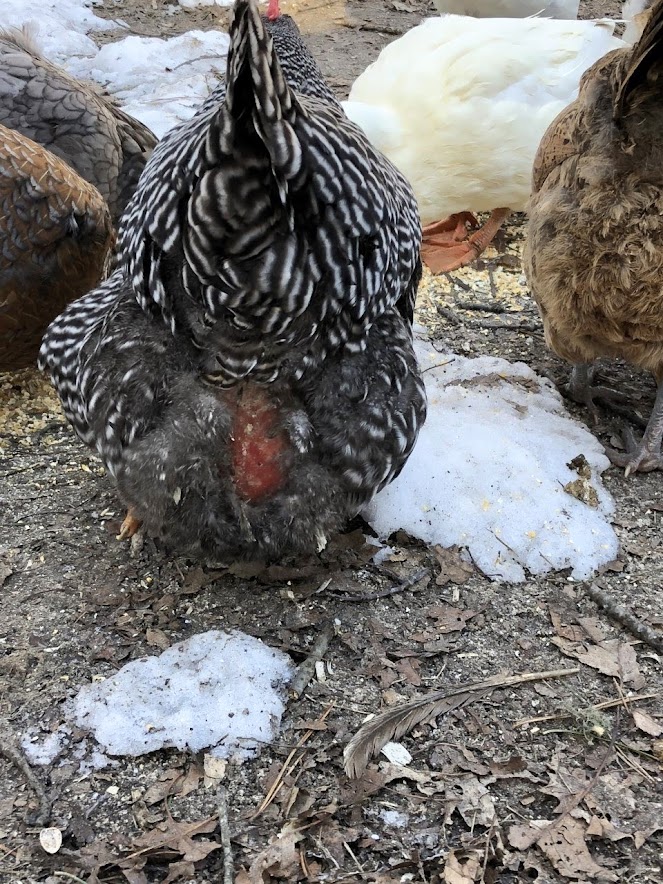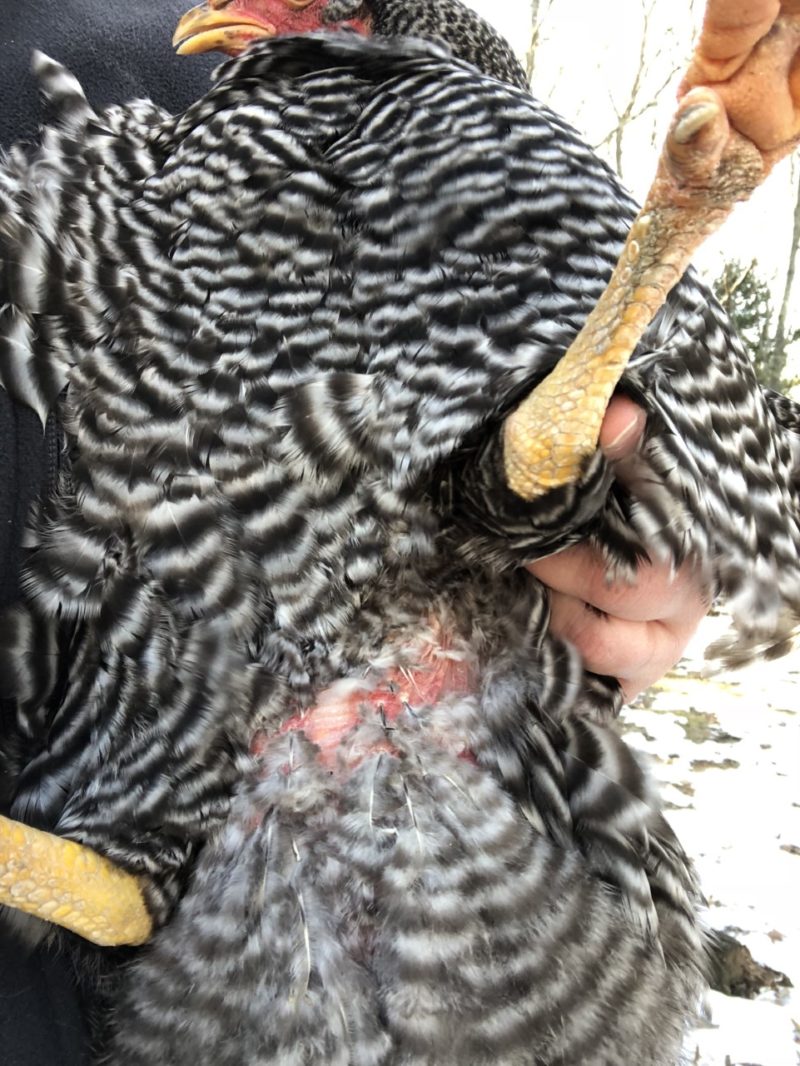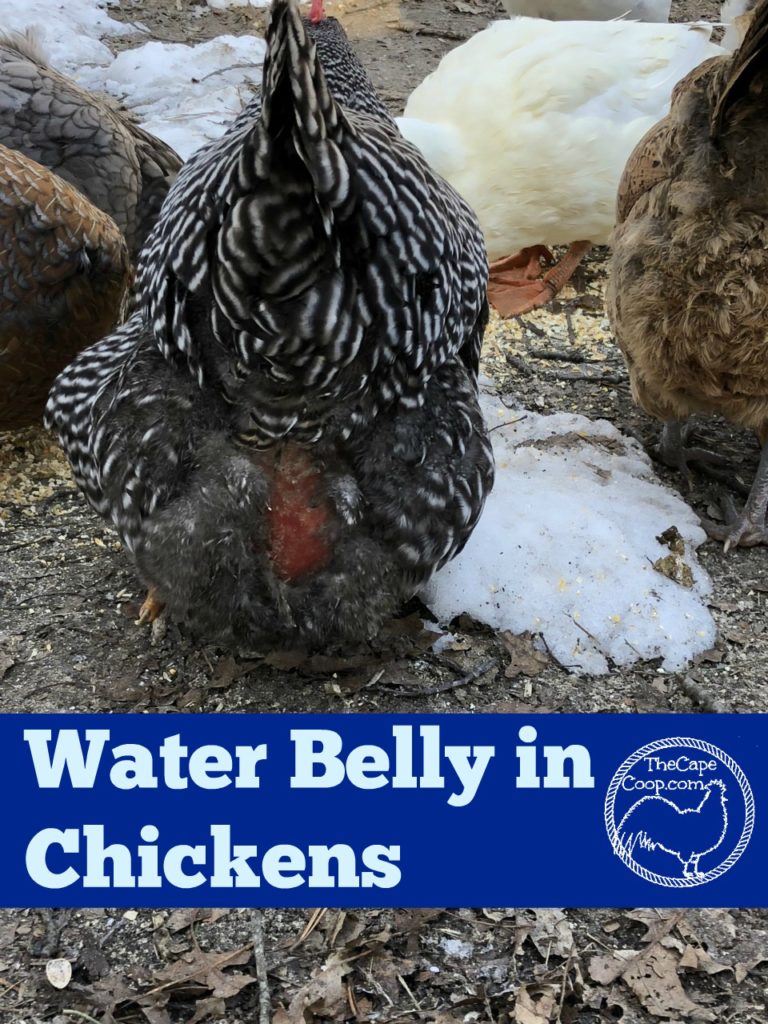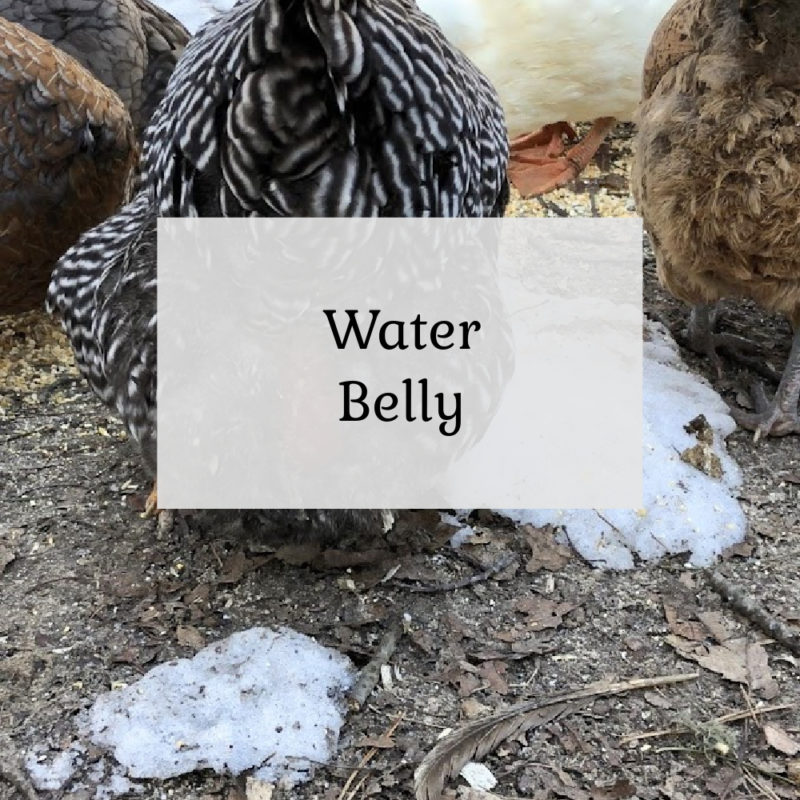---------------------------------------------------------
Ascites, also called Water Belly, is a common problem with fast-growing meat chickens. It can also be seen in older laying hens. Water Belly is not a disease, so it is not contagious to the rest of your flock. It is a symptom of a deeper problem, and unfortunately, the underlying cause is eventually fatal.
Symptoms
A hen with water belly will usually have the following symptoms:
- swollen & distended abdomen that is soft, squishy, and feels full of liquid
- red skin along their abdomen, likely missing feathers
- waddling when walking
- blue/purple tint to her comb & wattles
- labored breathing
- lethargy & lack of appetite

Causes
A chicken with water belly is usually suffering from heart disease and/or hypertension. The strain of heart disease causes their liver to stop functioning properly. When the liver isn’t functioning properly, fluid begins leaking from the liver into the abdominal cavity causing a fluid filled pocket, “water belly”.
Occasionally in very old (5+ years) chickens, the cause of the liver failure is a tumor in their reproductive system. In any event, if your chicken has water belly, it is definitely not a good sign. There is likely a serious issue with your chicken’s health.

Risk Factors
Water belly is most often seen in fast growing meat chickens. Their bodies sometimes grow too fast, putting too much stress on their hearts. In meat chickens, this can often happen around 4-6 weeks when they go through a growth spurt.
Older laying hens (5 years or older) have a higher risk just because of their advanced age and the natural deterioration of their systems as they age.
Genetics – premature heart failure and developing water belly can both be hereditary. A chicken with water belly should not be used in breeding programs.
High altitudes – less oxygen in the air can put stress on the chicken’s heart
Extreme temperatures – stress the chicken’s system, especially when they are chicks, make sure they don’t get chilly. Extended heat waves can also stress their heart.
Diet issues – too much feed can lead to obesity and stress on the heart & liver. Too much protein & too much sodium can also cause premature heart failure.
Ventilation issues – not enough ventilation in the coop can lead to excessive ammonia fumes which causes issues with several organs
How to help a chicken with water belly
Unfortunately, there is no cure for water belly, but you can help relieve her pain. A similar situation can happen in humans with certain cancers. In humans, the fluid build up can be very painful as it stretches the skin and pushes against internal organs. So I would assume this condition is also painful for chickens.
You can help relieve the pain by draining the fluid build-up with a syringe. It is a temporary fix. It will make your chicken more comfortable in the short term but will not “cure” the problem. The cavity will fill back up and you will have to keep draining it to relieve the pressure. In the early stages it could take months before you have to drain it again, in later stages of heart failure it could fill back up in days.
Draining the fluid
Use a sterile medium gauge needle with a syringe. 18 or 20 gauge needle with a 30 ml syringe works well. Wear gloves and clean the area with rubbing alcohol before & after draining. The chicken could go into shock if you drain too much fluid too fast. I recommend not draining more than 30 ml in one sitting and going slow.
It is easiest if you have someone to help you hold the chicken while draining. If you are alone, try holding the chicken in a football hold to your side, with the chicken facing backward. Keep the chicken upright, chickens should never be placed on their backs, it can cause heart & lung distress. Now you can steady the chicken with your arm leaving both hands to work the syringe & needle. You only need to insert the needle a little bit. Insert at a slight angle and use the syringe to slowly draw fluid out. It should not be bloody. The fluid drained from the cavity should be yellow in color which confirms it is indeed leaking from the liver. It could be clear or cloudy.
Having a chicken with Water Belly is not an immediate death sentence. As I mentioned, the fluid-filled cavity is a symptom, not the disease. Draining the cavity will not “cure” your chicken but it will ease her symptoms, making her much more comfortable. She could live another year or more before the heart disease becomes fatal. The cavity will continue to fill up and you will have to continue to drain it periodically.
Not draining the cavity will be painful for your chicken to live with. Sadly, the only other option, if you do not want to drain the cavity, is to cull the bird to end their suffering.
Click here to read about assembling a chicken first aid kit
Preventing Water Belly
While many of the risk factors for developing water belly are out of your control, there are a few things you can do to raise healthy hearted hens. Just like human hearts, chicken hearts respond best to a balanced, nutritious diet, plenty of fresh air & exercise, and a low stress lifestyle. Regularly cleaning your chicken’s living quarters, giving them quality feed and fresh, clean water will go a long way in raising healthy, long lived hens.







Daniella daniels
Wednesday 22nd of November 2023
Thanks for the enlightenment
Maria schimmel
Monday 19th of June 2023
Got a farm raised chicken everything was done when cleaning inside found 0range liquid balls in cavity is this a Mexican thing
Liz
Tuesday 20th of June 2023
I am sorry, I am not super experienced with chicken autopsies. I am not sure what orange liquid balls would be, sorry I can't be more help
Gwen
Monday 29th of May 2023
Thank you so much for this information,i hav learnt one or two things.Stay blessed
Bryan
Wednesday 10th of May 2023
Hi Liz, I believe my hen has water belly and will work to drain her and see how that helps. This information and your follow up comments on an article over 5 years old are truly amazing, thanks for your time.
Liz
Wednesday 17th of May 2023
I hope this helps your hen!
Cristina
Friday 14th of April 2023
HI there,
I have a hen with water belly. Im familiar with it because I had another hen that had it but ultimately passed. I know how to drain the fluid so I tried yesterday. I was able to get some out but eventually the syringe stopped suctioning. Today I tried again and I could not get suction and what eventually came out was blood stained. She seems to have internal bleeding as I can see her skin is bluish on one side of her belly. I'm concerned she won't make it another day. My question is do I try to drain again? If its bloody what does that mean?
Liz
Sunday 16th of April 2023
Are you sure you didn't accidentally insert the needle into a vein? It could just be the position of the needle that is causing you to draw some blood instead of fluid. A blueish color is often seen in the wattles and combs of chickens that have water belly, but not usually seen in the abdomen. I think you may be right that something else is going on, something that is causing internal bleeding. Do you have a local vet that you can consult with? Without xrays or testing the extracted fluid, it's hard to really say what could be causing internal bleeding or blood in the fluid. I would try to drain her again but in a slightly different location. I am sorry, I hope she finds some relief soon